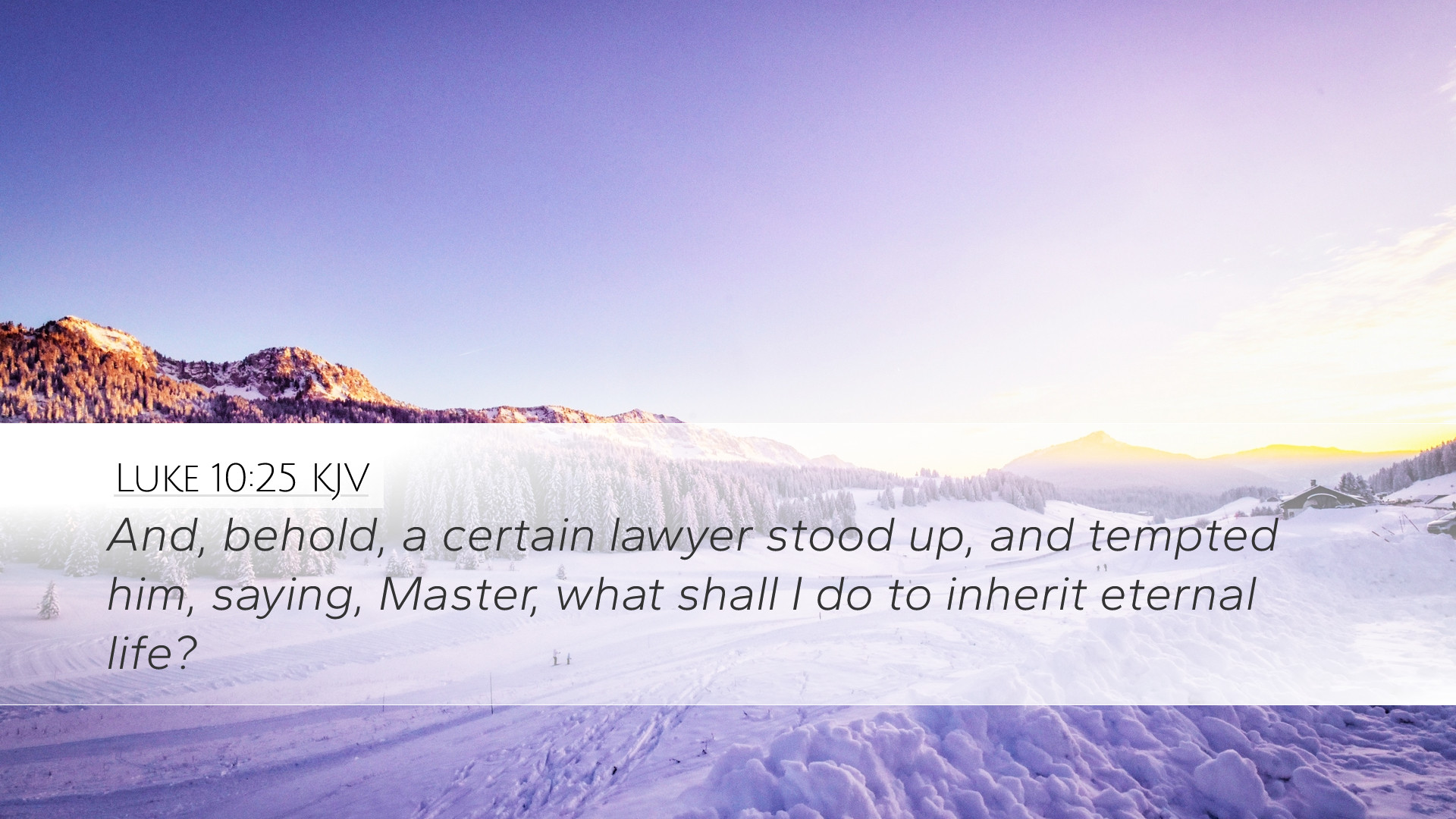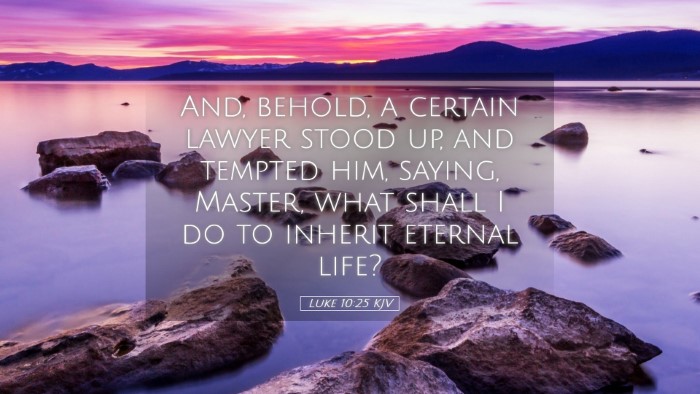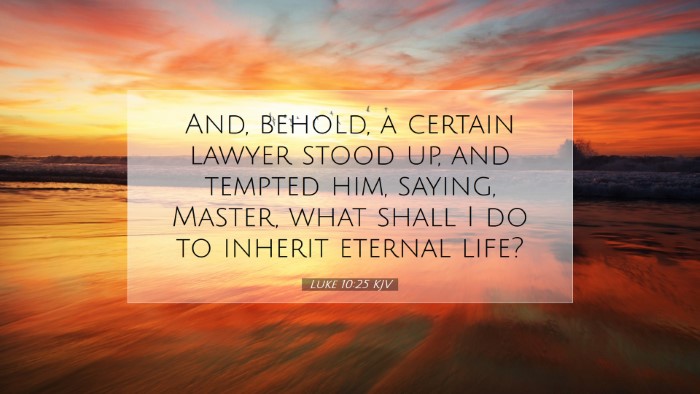Commentary on Luke 10:25
Verse: "And behold, a lawyer stood up to put him to the test, saying, 'Teacher, what shall I do to inherit eternal life?'"
This passage initiates a profound exchange between Jesus and a lawyer, inviting both theological inquiry and ethical reflection. As we analyze this text, insights from various public domain commentaries will illuminate the layers of meaning present within this encounter.
Contextual Background
The scene unfolds as Jesus' ministry is attracting public attention, with both supporters and challengers vying for His insight and authority. The term “lawyer” refers to an expert in Mosaic Law, and his questioning is intended to test Jesus' understanding of the sacred text.
Matthew Henry's Commentary
Matthew Henry emphasizes the lawyer's intent to “put him to the test,” suggesting that the question arises from a place of skepticism rather than genuine curiosity. Henry posits that the lawyer represents those who are well-versed in the Scriptures but may not grasp the essence of the law’s purpose. This reflects a broader theme in Luke's Gospel regarding the conflict between true understanding and superficial knowledge of God's Word.
Albert Barnes' Notes
Barnes draws attention to the phrase “inherit eternal life.” He clarifies that eternal life is not merely a future promise but a present reality that influences how one lives. The lawyer’s question suggests a misunderstanding of the means by which one acquires eternal life; it cannot be earned through legalistic adherence to the law, but rather through a relationship with God. Barnes elucidates that this question serves as a foundation for Jesus’ subsequent teaching on love and mercy.
Adam Clarke's Commentary
Clarke argues that the lawyer’s question may not only reflect academic inquiry but also a desire to provoke a theological debate among the gathering crowd. He keenly observes that the question implies a dual concern for legal righteousness and assurance of salvation. Clarke notes that the response from Jesus will reveal deeper truths about law, grace, and human obligation.
The Nature of the Question
The inquiry posed by the lawyer is critical for several reasons:
- Legalistic Approach: The lawyer's question reflects a legalistic mentality that seeks to quantify the requirements for salvation.
- Search for Assurance: His pursuit of everlasting life underlines a fundamental human desire for security in one's spiritual state.
- Challenge to Jesus: By asking a question that could challenge prevailing interpretations of the law, the lawyer attempts to place Jesus in a precarious position.
Jesus’ Response and Its Implications
Jesus responds to the lawyer not with immediate answers but by posing a question in return. This method serves several important functions:
- Inviting Reflection: By asking the lawyer what the law says, Jesus invites personal reflection on the Scriptures rather than providing a direct answer.
- Highlighting Self-Righteousness: The back-and-forth nature of the exchange exposes the lawyer's self-righteousness and limited understanding of the law's intent.
- Encouraging Dialogue: This approach opens a channel for dialogue and further exploration of the themes of love and righteousness.
The Role of Love in Inheriting Eternal Life
As the dialogue unfolds, Jesus will direct the lawyer back to the core of the law, which is love—both towards God and neighbor. This pivotal point resonates with the commentaries of both Henry and Clarke, who assert that genuine obedience to the law is rooted in love, thereby fulfilling its true demand.
Theological Reflections
The entire interaction raises critical theological questions regarding the nature of eternal life, the role of the law, and the heart of true discipleship.
- Eternal Life as Relationship: This passage illustrates that eternal life is not solely about future hope, but about an ongoing, transformative relationship with God through Christ.
- Law and Grace: The dialogue highlights the balance between the law and grace, inviting reflection on how they coalesce in the believer's life.
- The Call to Action: The questions posed encourage readers to actively engage with their faith, pushing them towards a lived expression of love.
Practical Applications for Today
For pastors, students, and theologians, this passage offers numerous practical applications, including:
- Examining Motivations: It challenges us to consider our own motives for engaging with God’s Word—are we seeking to test, or to learn and grow?
- Contextualizing Love: It invites us to continually assess how love is manifest in our own lives and communities as a reflection of our faith.
- Equipping for Ministry: This passage equips ministers to understand the importance of love as the foundation of teaching and pastoral care.
Conclusion
The inquiry of the lawyer in Luke 10:25 and Jesus’ response serve as profound indicators of the heart of the Gospel. It reveals the enduring truth that eternal life is not just a future expectation, but a present reality grounded in love and obedience to God's will. Through the wisdom of Matthew Henry, Albert Barnes, and Adam Clarke, we find a rich tapestry of insight that continues to resonate with the faithful community today, urging us toward deeper reflection and more profound expressions of our faith.


